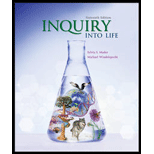
To analyze:
The properties and role of water in the movement of nutrient in plants.
Introduction:
Water plays an important role in plant life. For proper growth and development, and for maintaining all the physiological activities of the cell, a proper balance of water is very much necessary. Water is released from the plant and again produced in the plant to keep it in a balanced state.
Explanation of Solution
In a plant’s life, the requirement of water is always maintained so that the plants are able to survive in any environmental conditions. There are some properties of water which helps the movement of nutrients in plants and other functions too. Some of the properties of water are:
The Polarity of water: Water is made up of two molecules of hydrogen and one molecule of oxygen where the two-hydrogen atom binds to one side of the oxygen creating an imbalance in the polarity. The hydrogen atom will have the least positive charge and more negative charge is developed in the oxygen atom. This always keeps the water in the liquid state. It is very easy for plants to absorb water in its liquid state from the soil and transport it to other parts. Because of its difference in polarity, the shape of water can easily be changed to droplets.
Cohesion and Adhesion: The more electronegative property of the oxygen side in the water attracts the positive hydrogen side of other water molecules forming a hydrogen bond between them. This results in clumping of water molecules together forming droplets and once they stick to the xylem, it helps in their easy movement to a larger distance.
Capillary Property: The capillary action of water brings the water molecules on the surface of the leaf through the xylem. The evaporation at the surface of the leaf and the cohesion-adhesion properties of water makes the water molecules to move in a narrow capillary tube and maintain the continuity of water columns in plants.
High specific heat: The water droplet, once they reach the surface of the leaf, will evaporate and release oxygen and hydrogen molecule in the atmosphere. The oxygen and hydrogen molecules are released in an exchange process. The atmosphere will release carbon dioxide required by the plants only when the plants release oxygen and hydrogen.
Plants absorb water through capillary action from the soil through their roots via the xylem. When the water reaches the surface of the leaf, it is evaporated and is lost in the form of oxygen and hydrogen. The properties of water make them simple and easy for the plants to absorb it.
Want to see more full solutions like this?
Chapter 9 Solutions
Inquiry Into Life (16th Edition)
- What are the roles of DNA and proteins inside of the cell? What are the building blocks or molecular components of the DNA and proteins? How are proteins produced within the cell? What connection is there between DNA, proteins, and the cell cycle? What is the relationship between DNA, proteins, and Cancer?arrow_forwardWhy cells go through various types of cell division and how eukaryotic cells control cell growth through the cell cycle control system?arrow_forwardplease make the drawing and steps of whats it asking. thank you!arrow_forward
- please fill in empty spots. thank you!arrow_forwardplease fill in the empty sports, thank you!arrow_forwardIn one paragraph show how atoms and they're structure are related to the structure of dna and proteins. Talk about what atoms are. what they're made of, why chemical bonding is important to DNA?arrow_forward
- What are the structure and properties of atoms and chemical bonds (especially how they relate to DNA and proteins).arrow_forwardThe Sentinel Cell: Nature’s Answer to Cancer?arrow_forwardMolecular Biology Question You are working to characterize a novel protein in mice. Analysis shows that high levels of the primary transcript that codes for this protein are found in tissue from the brain, muscle, liver, and pancreas. However, an antibody that recognizes the C-terminal portion of the protein indicates that the protein is present in brain, muscle, and liver, but not in the pancreas. What is the most likely explanation for this result?arrow_forward
- Molecular Biology Explain/discuss how “slow stop” and “quick/fast stop” mutants wereused to identify different protein involved in DNA replication in E. coli.arrow_forwardMolecular Biology Question A gene that codes for a protein was removed from a eukaryotic cell and inserted into a prokaryotic cell. Although the gene was successfully transcribed and translated, it produced a different protein than it produced in the eukaryotic cell. What is the most likely explanation?arrow_forwardMolecular Biology LIST three characteristics of origins of replicationarrow_forward
 Human Anatomy & Physiology (11th Edition)BiologyISBN:9780134580999Author:Elaine N. Marieb, Katja N. HoehnPublisher:PEARSON
Human Anatomy & Physiology (11th Edition)BiologyISBN:9780134580999Author:Elaine N. Marieb, Katja N. HoehnPublisher:PEARSON Biology 2eBiologyISBN:9781947172517Author:Matthew Douglas, Jung Choi, Mary Ann ClarkPublisher:OpenStax
Biology 2eBiologyISBN:9781947172517Author:Matthew Douglas, Jung Choi, Mary Ann ClarkPublisher:OpenStax Anatomy & PhysiologyBiologyISBN:9781259398629Author:McKinley, Michael P., O'loughlin, Valerie Dean, Bidle, Theresa StouterPublisher:Mcgraw Hill Education,
Anatomy & PhysiologyBiologyISBN:9781259398629Author:McKinley, Michael P., O'loughlin, Valerie Dean, Bidle, Theresa StouterPublisher:Mcgraw Hill Education, Molecular Biology of the Cell (Sixth Edition)BiologyISBN:9780815344322Author:Bruce Alberts, Alexander D. Johnson, Julian Lewis, David Morgan, Martin Raff, Keith Roberts, Peter WalterPublisher:W. W. Norton & Company
Molecular Biology of the Cell (Sixth Edition)BiologyISBN:9780815344322Author:Bruce Alberts, Alexander D. Johnson, Julian Lewis, David Morgan, Martin Raff, Keith Roberts, Peter WalterPublisher:W. W. Norton & Company Laboratory Manual For Human Anatomy & PhysiologyBiologyISBN:9781260159363Author:Martin, Terry R., Prentice-craver, CynthiaPublisher:McGraw-Hill Publishing Co.
Laboratory Manual For Human Anatomy & PhysiologyBiologyISBN:9781260159363Author:Martin, Terry R., Prentice-craver, CynthiaPublisher:McGraw-Hill Publishing Co. Inquiry Into Life (16th Edition)BiologyISBN:9781260231700Author:Sylvia S. Mader, Michael WindelspechtPublisher:McGraw Hill Education
Inquiry Into Life (16th Edition)BiologyISBN:9781260231700Author:Sylvia S. Mader, Michael WindelspechtPublisher:McGraw Hill Education





